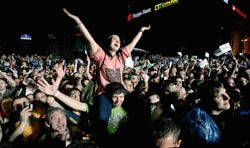Revolution no. 50

I have never been a Beatles fan and the only album of theirs I ever owned was the White Album. The Liverpool singers sounded syrupy to me, too melodious and too traditional, although I remember being angry when I heard the Fab Four’s creativity being described as “children’s songs” — and from none other than a dedicated fan. I listen to them and I’m no kid.
One thing I can’t figure out is why all those girls back then were screaming. I can’t help laughing when I watch the black and white footage of ecstatic girls weeping and fainting dead away. This phenomenon is inexplicable to me.
When I was studying at the Department of Theater Criticism, I was taught to analyze any kind of work, be it a play, film, novel, or story, proceeding from the title. The name of the English group is a pun on the word “beetles” and the closest possible Ukrainian equivalent is Zhiuky (instead of zhuky ). John Lennon was fond of wordplay, and he published a book entitled In His Own Write with short stories and line drawings, often surreal and always nonsensical. The name of their group is like a child or teenager deliberately distorting words; s/he knows the proper spelling but deliberately distorts it — a small rebellion against the rules of grammar.
When The Beatles burst onto the scene, young people on all continents finally received their full share of culture, even if was mass culture. Thanks to them, a large bridgehead was seized, where adult laws were not obeyed. During the preceding centuries, relations between the younger and older generations were rigidly hierarchical: you must study hard, listen to your teachers, and once you grow up, you will work, consume, and die.
“But when will we get around to simply living?” the first postwar generation asked, recalling the eloquent examples of what the rule of “the moral majority” had cost in terms of human blood. The youth revolution did not break out in 1968, but almost a decade earlier. Its war cry was that child’s squalling, and its weapons and leaders were The Beatles, only two of whom are still alive today. This rock group freed us from the irksome rule of adults, while producing a matrix of our liberation, a matrix that is still being effectively used by new generations of rebels: music as the first stone in building a virtual or real barricade.
Speaking of construction, here it seems appropriate to mention the comments of a celebrated innovative architect of the early 1960s. In his polemic with one of his opponents, he drew the rather unexpected analogy that conservatives reject modern architecture, but they enjoy listening to The Beatles. He meant that this pop and rock group would be forgotten in 50 years. But they have the right to exist, and so do new ideas for urban development that must last for centuries.
That architectural reformer was mistaken. Half a century passed, but no one even dreams of forgetting The Beatles. The revolution goes on.
For many generations of former Soviet people, The Beatles spelled freedom, above all, even though at the time the Liverpool quartet made its first appearance there was no freedom in our country. Their music stole its way into the Soviet Union in the form of nearly erased tape recordings and homemade LPs of Beatles songs, a glimpse of that other life behind the Iron Curtain. That is why McCartney’s visit to Kyiv was so important. Better late than never, we finally became plugged into the “value arteries” that keep the rest of the world alive. Now we know what real freedom is all about, although we are just learning to be free, like Paul McCartney, who showed us the way.
(Read Dmytro Desiateryk’s article on the Paul McCartney concert in Kyiv in the Time Out section of The Day .)






